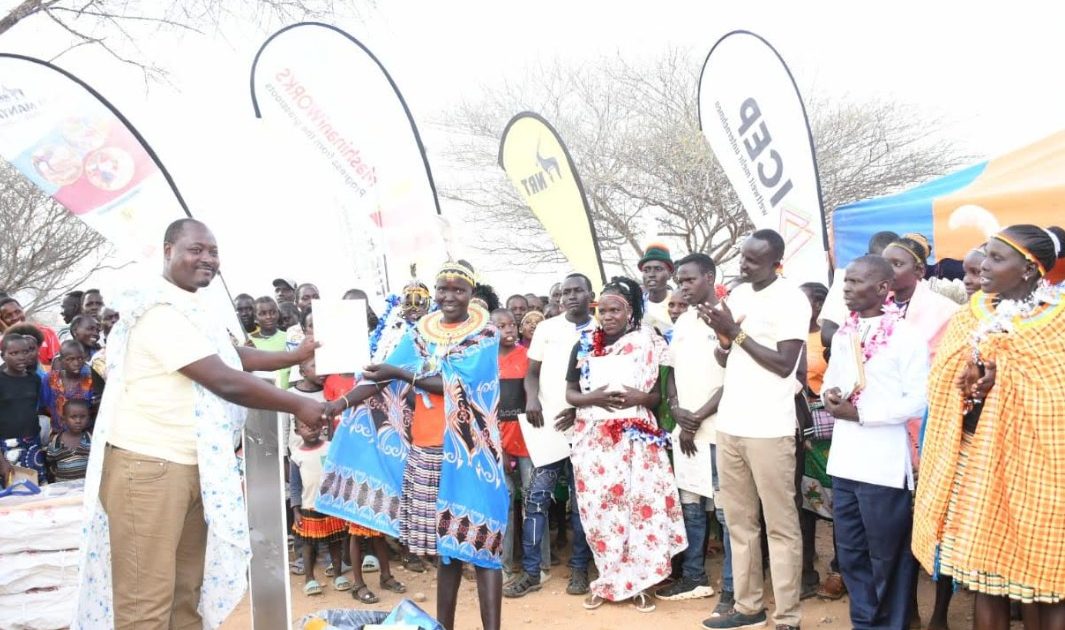Thirty-five young men and women from Pellow Community Conservancy in West Pokot County have successfully graduated from a three-month vocational skills training programme through the Mashinani Works programme, under the initiative Ujuzi Mnyattani.
The programme, which has been supported by the International Centre for Environmental Protection (ICEP) and Northern Rangelands Trust (NRT), aims to empower youth in rural communities by providing them with critical vocational training, equipping them with essential skills and providing start-up toolkits to launch their self-employment ventures.
The initiative is meant to boost the targeted youths to improve their livelihoods and contribute to local economic development.
The trainees, who completed courses in motorcycle repair and maintenance, hairdressing and beauty therapy, tailoring and dressmaking, and masonry, were recognised during a vibrant ceremony that saw them receive their certification for their hard work and dedication.
Speaking at the ceremony held in Turkwel, West Pokot Sub-County, Pellow Conservancy Manager, Francis Namalu, commended the graduates for their achievements and emphasized the wider social impact of the programme. “We have 35 students who have successfully graduated in the courses they chose, which will not only benefit them personally but also contribute positively to society,” Namalu stated.
Namalu said the Ujuzi Manyattani vocational training programme has made a profound impact in West Pokot County, having successfully trained and seen 1,523 youth and women graduate.
He said as part of the Mashinani Works initiative, the program not only provides high-quality, hands-on training but also equips each graduate with a start-up toolkit tailored to their trade.
Namalu said the courses offered through the Mashinani Works programme were carefully selected to meet the needs of the local community, ensuring that the graduates are equipped with skills that will be useful in both the local economy and in addressing wider community challenges.
“The programme has empowered our youth with valuable skills that they can now apply in real-world settings, creating opportunities for themselves and others,” Namalu added.
He emphasized the significant impact of the Mashinani Works programme, both on the individual lives of the graduates and the community as a whole.
He pointed out the programme’s role in addressing harmful practices such as female genital mutilation and early marriages.
“Instead of engaging in these practices, many young people are now focused on developing skills that will help them become self-reliant and secure a better future,” Namalu added.
He said the Mashinani Works programme is designed to provide young people with an alternative path—one that empowers them with the knowledge and skills to support themselves, their families, and their communities.
Namalu also expressed his gratitude to NRT for their continued support of the programme, as well as to the parents who allowed their children to pursue these courses.
Area Chief Isaiah Ronyet, urged NRT and other partners to expand skill-building programmes, particularly in areas where youth are involved in theft or other criminal activities. “We need to bring these programs into the streets so that young people who engage in theft can learn valuable skills,” Ronyet said.
One of the graduates, Nickson Mnang’at, expressed gratitude for the opportunity to participate in the Mashinani Works programme.”I want to thank NRT for bringing these valuable skills to us in Ujuzi Manyattani. Through the training, we have learnt not only to be self-reliant but also to help others in our community,” Mnang’at said.
He emphasised how the programme has given him the confidence to pursue a Mechanic Course career, saying that he is ready to contribute to the local economy with his new skills.
Mnang’at advised his peers who are involved in harmful activities, like engaging in livestock theft, to stop and instead attend classes to develop themselves academically and build a better future.
On her part, Ruth Cheyech, who undertook the Hairdressing and Beauty Therapy course, shared her journey and the impact the programme has had on her life. “I am grateful for the skills I have gained in this programme. I advise girls that even if they do not get a place in the local work programme, they still have a chance to join the government’s Technical and Vocational Education and Training institutions (TVETs) and develop their skills,” Cheyech said.
With continued support from NRT, ICEP, and local families, the Mashinani Works programme is set to expand, allowing more youth to gain the skills they need to thrive and contribute to their communities.
By Agneta Chebet




